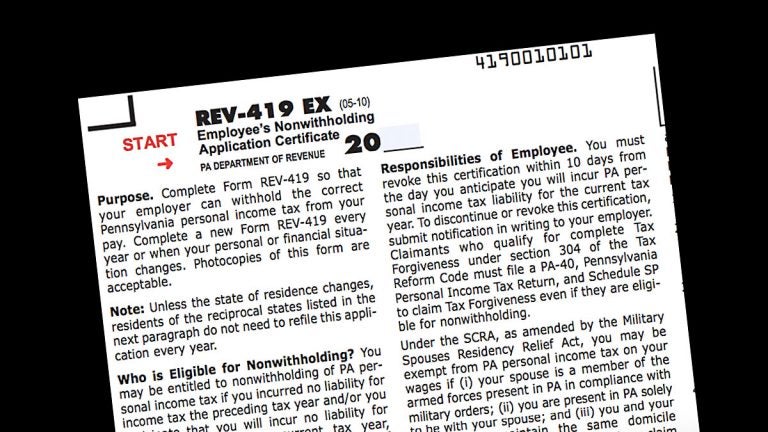Christie reverses position, will keep Pa.-N.J. reciprocal tax agreement [updated]
Listen
New Jersey residents working in Pennsylvania initially file Form REV-419EX to comply with tax laws.
New Jersey Gov. Chris Christie reversed his decision to end a long-standing tax agreement with Pennsylvania on Tuesday.
Nearly three months after announcing he would end a 39-year-old policy if the state couldn’t shave $250 million from state employee health care costs, Christie said in a statement he was satisfied with reform efforts made.
The announcement came as a relief to elected officials on both sides of the Delaware.
“It’s something really to give thanks for, that we’re going to save over 125,000 new Jerseyan’s taxes,” said New Jersey Senate President Steve Sweeney at a news conference to discuss keeping the agreement.
According to U.S. Census Bureau estimates, roughly the same number of Pennsylvanians also trek over to New Jersey for work.
Pennsylvania state Rep. Steve Santarsiero, D-Bucks, and Pennsylvania Department of Revenue secretary Eileen McNulty also praised Christie’s decision.
Under the policy, called tax reciprocity, residents of the two states who commute for work will continue to pay state income taxes where they reside. Due to disparities in the two states’ tax structures, ending the agreement would have hit many residents in both states with higher taxes.
New Jersey has a graduated income tax ranging from 1.4 to 8.97 percent, while Pennsylvania has a flat rate of 3.07 percent.
That means high-wage earners in who live in Pennsylvania but work in New Jersey would have faced much higher tax bills. Lower-wage earners, commuting from New Jersey into Pennsylvania, would have also seen a bigger bite taken out of their paychecks, in more ways than one.
“New Jerseyans who commute to work in Philadelphia would have also lost their credit for paying the city’s wage tax,” read a statement Tuesday from New Jersey Democrats. “Without the pact, they would no longer be able to claim a credit for paying the city’s wage tax, which is 3.47 percent for nonresidents.”
Aside from residents’ concerns, some corporations relocating to South Jersey were getting cold feet and considered altering their plans in the wake of the tax change, according to the Philadelphia Inquirer.
Their fears appear to be assuaged by Christie’s decision to remain in the agreement.
“I had a conversation with Tom Doll this morning, the president/COO of Subaru, who has recommitted to start their construction again, and, more importantly, to bring their national training center to Camden,” said U.S. Rep. Donald Norcross, D-New Jersey, at the press conference.
While the cost to individuals will stay the same, continuing the agreement means New Jersey forgoes an estimated $180 million in annual tax revenue.
To justify keeping the agreement, the Legislature worked with the state employees union to find savings in the cost of prescription drugs in their health care benefits — equivalent to $200 million — that Sweeney said will not affect the level of care.
Learn more about the Reciprocity Agreement

WHYY is your source for fact-based, in-depth journalism and information. As a nonprofit organization, we rely on financial support from readers like you. Please give today.




